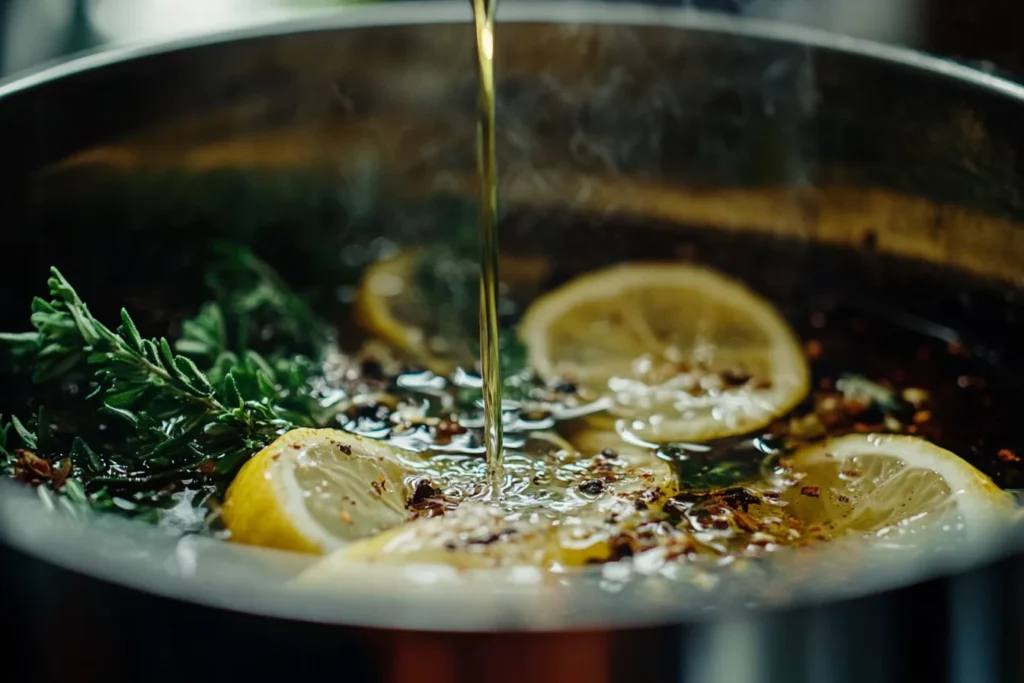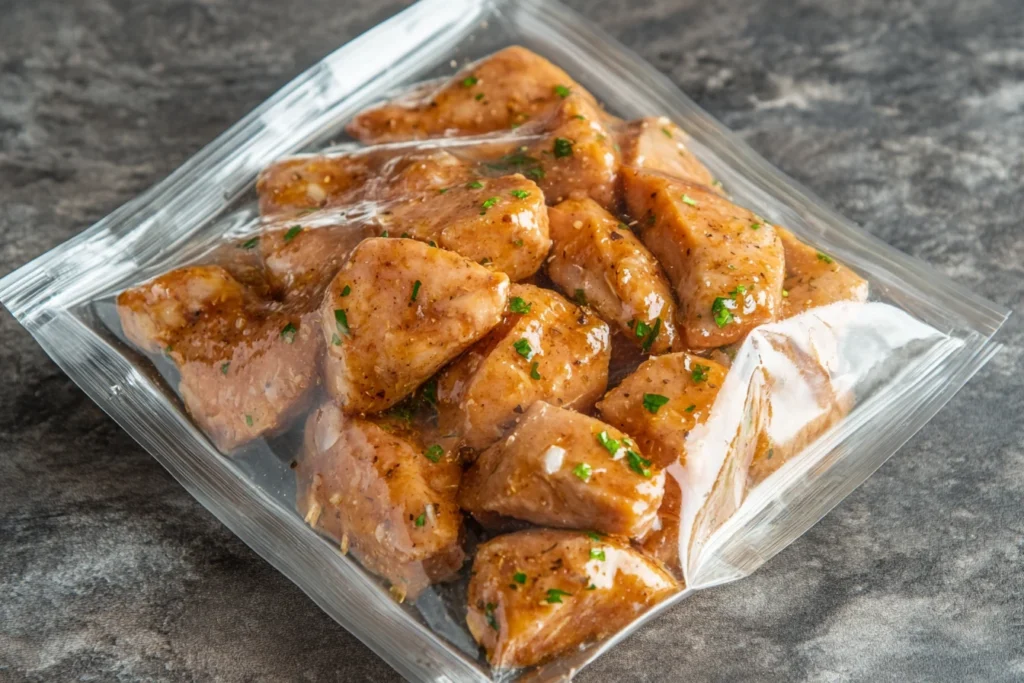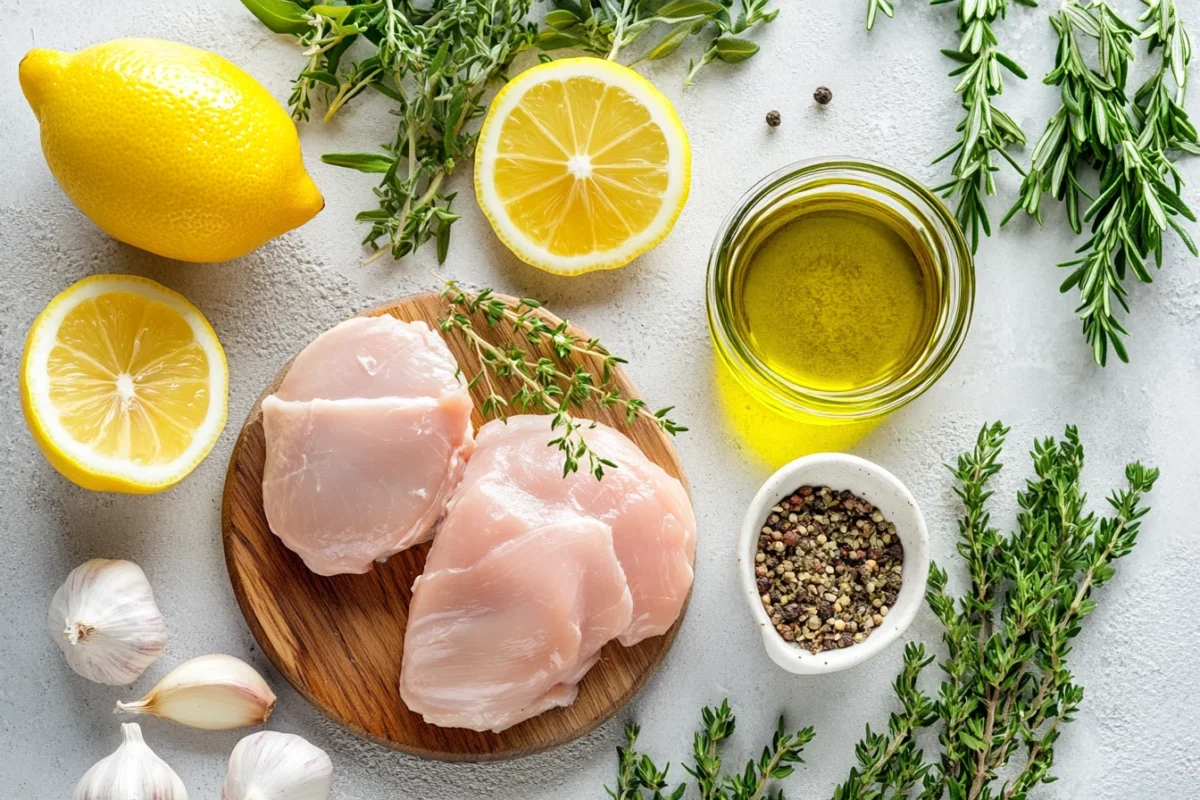What Is the Secret to a Good Marinade for Chicken?
Marinades are the secret to making chicken taste amazing, turning plain cuts into flavorful dishes. But what makes a great chicken marinade? It’s a mix of the right ingredients, a bit of know-how, and some creativity. In this article, we’ll cover what you need to know about marinades, the best ways to use them, and how to avoid common mistakes. Whether you’re new to cooking or an experienced chef, you’ll discover how to make chicken tender, juicy, and packed with flavor.
Understanding Chicken Marinades
What Is a Marinade?
A marinade isn’t just a flavored liquid; it’s a blend carefully designed to add taste and improve texture. Made with three key parts—acid, fat, and seasonings—it works by soaking into the chicken, adding bold flavors and making the meat tender.
Acids like lemon juice or yogurt help soften the meat, while oils like olive or sesame oil carry the flavors deep into the chicken. Herbs, garlic, and spices add even more flavor, creating a delicious and unique dish. In short, marinades take chicken from ordinary to extraordinary.
Importance of Marinating Chicken
Marinating does more than enhance taste; it also tenderizes the meat, especially lean cuts like chicken breasts. The acid in the mixture interacts with the proteins, creating a softer texture, while the oil adds moisture to prevent dryness.
But that’s not all. A properly marinated chicken ensures even cooking by sealing in moisture. This is especially important for grilling or roasting, where heat exposure can easily sap the juiciness of the meat. Skipping the marinade step could mean missing out on that perfect blend of tenderness and flavor.
Key Components of a Good Chicken Marinade
A stellar chicken marinade balances the following elements:
- Acids: These tenderize the chicken. Lemon juice, lime, or vinegar are classic choices.
- Fats: Oils like olive or avocado oil moisturize and enhance flavor absorption.
- Seasonings: Garlic, ginger, black pepper, paprika, and fresh herbs add depth and complexity.
- Salt: It’s essential not just for flavor but also for locking in the meat’s natural juices.
Understanding the purpose of each ingredient ensures you create a marinade that’s perfectly balanced—not too sharp, oily, or salty. For every three parts of oil, use one part acid, then layer in your favorite seasonings for a marinade that works like magic.

Crafting the Perfect Chicken Marinade
Selecting the Right Ingredients
The ingredients in a chicken marinade are like the players on a winning team—each one has a critical role to play. Choosing high-quality, fresh ingredients is non-negotiable if you want the best results.
Fresh herbs such as cilantro, rosemary, or thyme pack a punch far beyond their dried counterparts. Cold-pressed oils, like extra-virgin olive oil, deliver a richer, more natural flavor. Meanwhile, your choice of acid—whether it’s lime juice for a zesty kick or apple cider vinegar for a tangy depth—sets the foundation for the marinade’s profile.
When considering the chicken itself, opt for free-range or organic cuts if possible. The natural flavor of high-quality chicken pairs exceptionally well with the nuances of a well-crafted marinade, ensuring every bite is satisfying.
Balancing Flavors: The Role of Acids, Fats, and Seasonings
A successful marinade is all about balance. Overdo one component, and you risk overpowering the chicken. Here’s how to strike that harmony:
- Acids: They’re essential for tenderizing but should never dominate. A small splash of lemon juice or a few tablespoons of vinegar is all you need.
- Fats: Oils are the carriers of flavor. But be cautious—too much oil can make the marinade feel greasy rather than indulgent.
- Seasonings: This is where you get to play. From garlic and chili flakes to cumin and coriander, pick flavors that complement the dish you’re envisioning.
Taste the marinade before it touches the chicken. That’s right—treat it like a dip! This ensures the flavors are just right, allowing you to adjust seasonings before it’s too late.
The Science Behind Marinating Times
How long should you marinate chicken? This depends on the cut and the marinade’s composition. Smaller pieces, such as tenders or thighs, only need 2 to 4 hours to absorb flavors. Bone-in cuts or whole chickens benefit from longer marination—up to 24 hours.
However, there’s a catch. Over-marinating chicken, particularly with highly acidic mixtures, can actually break down the proteins too much, resulting in a mushy texture. Aiming for the sweet spot—just enough time for the acid and seasonings to work their magic—is key.
Always marinate chicken in the refrigerator to keep it safe from harmful bacteria. And don’t forget to discard used marinades that have come into contact with raw poultry unless you cook them thoroughly to destroy bacteria.
Stay tuned for the next part where we explore practical marinating techniques and how to avoid common mistakes!
Techniques and Tips for Marinating Chicken
Proper Marinating Techniques
The way you marinate chicken is as important as the ingredients themselves. Even the best marinade for chicken can fall short if it’s not applied correctly. To maximize flavor and ensure safety, follow these practical techniques:
- Use Non-Reactive Containers: Opt for glass, stainless steel, or food-grade plastic to avoid any chemical reactions with the acids in your marinade. Avoid aluminum or copper, as they can react with acidic ingredients and alter the flavor.
- Seal It Tight: A resealable plastic bag is your best friend. Not only does it allow the marinade to fully coat the chicken, but it also eliminates air pockets, improving absorption.
- Turn It Frequently: For even distribution, turn or shake the chicken periodically while it marinates. This ensures every surface gets an equal dose of flavor.
- Marinate in the Refrigerator: Never marinate chicken at room temperature—it’s a breeding ground for bacteria. Keep it chilled to preserve freshness and safety.
Simple adjustments like these can make a world of difference, turning a good marinade into a spectacular one.
Common Mistakes to Avoid When Marinating Chicken
Even seasoned cooks make missteps when marinating chicken. But knowing the pitfalls can help you avoid them:
- Over-Marinating: Leaving chicken in acidic marinades for too long can degrade the texture, making it unpleasantly mushy. Stick to the recommended times.
- Using Too Much Marinade: More isn’t always better. Excess marinade can overwhelm the chicken, masking its natural flavor.
- Reusing Marinade: Never pour leftover marinade onto cooked chicken. It’s unsafe unless boiled to kill any bacteria.
- Marinating in Reactive Materials: Containers like aluminum can impart a metallic taste to your chicken.
Keeping these mistakes in mind ensures that your marinade enhances rather than detracts from the dish.
Enhancing Flavor with Additional Ingredients
If you’re ready to elevate your marinade game, it’s time to get creative with ingredients. Think beyond the basics:
- Soy Sauce: Adds umami and saltiness, creating a deeper flavor.
- Honey or Maple Syrup: These natural sweeteners balance out tangy or spicy marinades and promote caramelization when cooking.
- Fresh Ginger and Garlic: Bring a punch of aromatic freshness that complements virtually any dish.
- Spices like Paprika or Cumin: Lend warmth and complexity, perfect for grilled or roasted chicken.
- Coconut Milk: A creamy base that pairs well with tropical or spicy flavors.
Experiment with combinations to tailor the marinade to your preferences. Who knows? You might stumble upon the perfect blend that becomes your signature recipe.

Frequently Asked Questions about Chicken Marinades
How Long Should I Marinate Chicken?
The marinating time largely depends on the cut and size of the chicken, as well as the type of marinade you’re using. For boneless cuts like breasts or thighs, 30 minutes to 2 hours is usually sufficient to infuse flavor. Larger cuts, such as drumsticks or a whole chicken, benefit from longer marination—up to 24 hours.
However, avoid marinating chicken for more than 24 hours, especially with highly acidic marinades. Over time, the acid begins to break down the proteins too much, leading to a mushy and unappetizing texture. Always refrigerate your chicken while marinating to keep it safe and fresh.
Can I Reuse Marinade?
Reusing marinade is a common question, but it’s a food safety hazard if not handled properly. A marinade that’s been in contact with raw chicken is loaded with bacteria and should never be used directly on cooked chicken.
If you want to use your marinade as a sauce, bring it to a boil for at least 5 minutes to kill any harmful bacteria. This process ensures the sauce is safe to consume while retaining the flavors of the marinade.
Should You Marinate Chicken with the Skin On or Off?
It’s entirely up to your preference and the type of dish you’re preparing. Skin-on chicken tends to crisp up beautifully when roasted or grilled, while the marinade adds flavor to the meat underneath. For skinless chicken, the marinade penetrates directly, delivering bold flavors throughout the cut.
To maximize flavor with skin-on chicken, loosen the skin slightly and rub the marinade underneath. This way, you’ll enjoy the best of both worlds—crispy skin and juicy, seasoned meat.
What Are the Best Herbs for Chicken Marinades?
Fresh herbs like thyme, rosemary, parsley, cilantro, and oregano are excellent choices for marinades. Each herb brings a unique flavor profile to the table. For instance, rosemary pairs well with garlic and lemon, while cilantro complements spicy or tangy marinades.
Feel free to mix and match herbs based on the cuisine you’re aiming for—be it Mediterranean, Asian, or classic American barbecue. Dried herbs can also work but tend to have a slightly milder flavor compared to their fresh counterparts.
Do Marinades Work Better on Certain Cuts of Chicken?
Absolutely! Marinades work exceptionally well on lean cuts like chicken breasts, which tend to dry out quickly when cooked. Thighs, drumsticks, and wings also benefit from marinating, as their higher fat content absorbs flavors deeply and stays juicy.
Whole chickens require longer marinating times but yield flavorful and tender results when done right. For quicker results, consider cutting the chicken into smaller pieces to maximize surface area for the marinade.
Practical Applications and Final Touches for Marinated Chicken
Grilling Marinated Chicken to Perfection
Grilling is one of the best ways to showcase the flavors of a good marinade for chicken. The high heat caramelizes the sugars and browns the proteins, creating a delightful crust that locks in the juiciness.
- Prepare the Grill: Preheat your grill to medium-high heat, ensuring it’s clean and oiled to prevent sticking.
- Pat Dry the Chicken: While it might feel counterintuitive, lightly patting the chicken dry with paper towels ensures even browning. The marinade has already done its job of infusing flavor.
- Cook Evenly: Place the chicken on the grill and avoid moving it too frequently. Flip only once to achieve those perfect charred grill marks.
- Check for Doneness: Use a meat thermometer to ensure the internal temperature reaches 165°F (74°C).
Grilling isn’t just about technique—it’s also about timing. Boneless cuts cook faster, while bone-in pieces need a bit more patience.
Roasting Marinated Chicken for Juicy Results
Roasting is an excellent choice for anyone seeking a hands-off cooking method that doesn’t compromise on flavor.
- Preheat the Oven: Set it to 375°F (190°C) to maintain consistent cooking throughout.
- Choose the Right Pan: A roasting pan with a rack allows proper airflow and prevents the chicken from becoming soggy in its own juices.
- Baste for Extra Flavor: Every so often, spoon pan juices over the chicken to lock in moisture and enrich its taste.
- Finish with a Broil: For a golden, crispy exterior, switch to the broiler for the final 2–3 minutes of cooking.
This method is particularly effective for whole chickens or larger cuts, delivering a juicy, tender interior paired with a beautifully caramelized exterior.
Storing Marinated Chicken Safely
When it comes to storage, safety should always be a priority.
- Refrigeration: Marinate chicken in the fridge for up to 24 hours. Always use an airtight container or resealable bag to avoid cross-contamination.
- Freezing: Did you know you can freeze marinated chicken? Place it directly in a freezer-safe bag with the marinade. Thaw in the fridge overnight before cooking for a quick, flavorful meal.
- Discard Used Marinade: Once the chicken has soaked, don’t reuse the leftover marinade unless it’s been boiled.
Storing properly not only keeps your chicken safe but also preserves the bold, fresh flavors of the marinade.

Conclusion
A good marinade for chicken is more than just a recipe—it’s a gateway to transforming simple ingredients into a culinary masterpiece. By understanding the essential components of marinades, selecting the right ingredients, and mastering proper marinating techniques, you can elevate your cooking game.
Balance is the secret: the interplay of acids, fats, seasonings, and salt creates a marinade that enhances the chicken’s flavor and tenderness without overwhelming its natural essence. Avoiding common mistakes, such as over-marinating or reusing raw marinades, ensures that your meals are both delicious and safe.
Whether you’re grilling to achieve a smoky char, roasting for juicy tenderness, or freezing pre-marinated chicken for a quick meal later, these methods allow flexibility and creativity in your kitchen.
The joy of cooking lies in experimentation, so don’t be afraid to tweak recipes, explore new flavor combinations, and make each dish your own. With this guide in hand, your marinated chicken will always be a crowd-pleaser, whether served at a family dinner, a summer barbecue, or a cozy weeknight meal.

